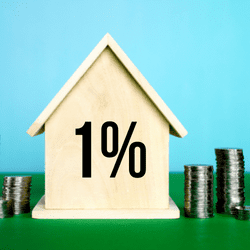When it comes to real estate, there are many terms and processes that may be unfamiliar to you, including earnest money. Our goal at The Young Team is to break down the home buying process in a way that you understand. We want to help you use this information to make the best decisions throughout your real estate transaction.
Earnest money is an up-front deposit you as the home buyer would make to the seller that represents your good faith in purchasing the home. This real estate deposit helps to demonstrate to the home seller that you are serious and willing to complete the purchase.
Find Out How Much Your Home Is Worth In Today's market
Get Your Home Value in Seconds

What are the standards for an earnest money deposit?
While there is no minimum required or standard amount for the realty deposit, our agents will typically recommend 1% of the home’s asking price. On a $200,000 offer on a home, a 1% earnest money deposit to the home seller would be $2,000. Every situation can be different, that is why it is important to talk with your realtor who knows the Northeast Ohio market and can help you determine what is best for you.
When is earnest money due?
Earnest money is due after the seller has accepted the initial home offer from the buyer. When you work with The Young Team, our contract states, the earnest money is due within 4 days of the seller’s acceptance of your offer. The earnest money is held in an escrow account by a third party (usually the real estate title company) until the deal is either closed or denied by either party.
Is earnest money required for a valid real estate contract?
No, although it is recommended for a stronger home offer, and it is customary in our Ohio housing market. Especially in a seller’s market where it is more likely that you are competing against multiple offers on a home.

How does an earnest money deposit help your offer stand out?
If there are two identical offers on a home except yours has an earnest money deposit and the competing offer does not, your offer will stand out. Having an earnest money deposit says to the seller you are serious about buying the home because you know if the deal falls through, you could potentially lose your deposit. However, there are circumstances where you can back out of a deal and the earnest money will be returned to you.
Who gets the earnest money deposit if the deal falls through?
Generally speaking, if the deal falls through during pre contingency, the earnest money goes back to you. During pre contingency, the home inspection, home appraisal, and mortgage approval process take place. If something is found during the home inspection (leaking pipes, mold, broken appliances, etc.), the appraisal of the home is lower than the offer you submitted, or you do not get approved for the home loan, you can back out of the deal and your earnest money deposit legally returns to you.
If the deal is not completed during post contingency or after the inspection, appraisal, and loan approval the seller assumes ownership of the earnest money. The seller also takes possession of the earnest money if for example it was agreed that the buyer has 10-15 days to inspect the property. If the inspection takes place on day 16, and from the inspection, you decide to not proceed you can still back out of the deal, but the earnest mo
Keep in mind, the specific terms of the agreement (who gets the money at different stages of the process if the deal falls through) are negotiated between both parties in a written contract. That way, the earnest money conditions are clear to the buyer and seller if the deal is not completed.

What is the difference between your earnest money deposit and your down payment?
An earnest money deposit is given to the seller as a promise to buy the home. A down payment is given to the lender as a promise to pay your mortgage. If the home transaction is not completed, there is a risk of losing your earnest money deposit. There is no risk of losing your down payment because this payment is not made until your offer is 100% accepted and you are officially buying the home.
It is important to remember, your earnest money is not extra money due on top of buying the home, but is applied to closing costs and/or the down payment. Another way of thinking of earnest money is like a home pre-down payment. For example, if your earnest money deposit was $2,000 and your final cash due at closing is $10,000 your deposit will be deducted from the final amount due leaving you with a balance of $8,000. Nonetheless, every situation can be a little bit different. That is why it is important to understand your options and work with a reputable real estate agent who can guide you every step of the way.




